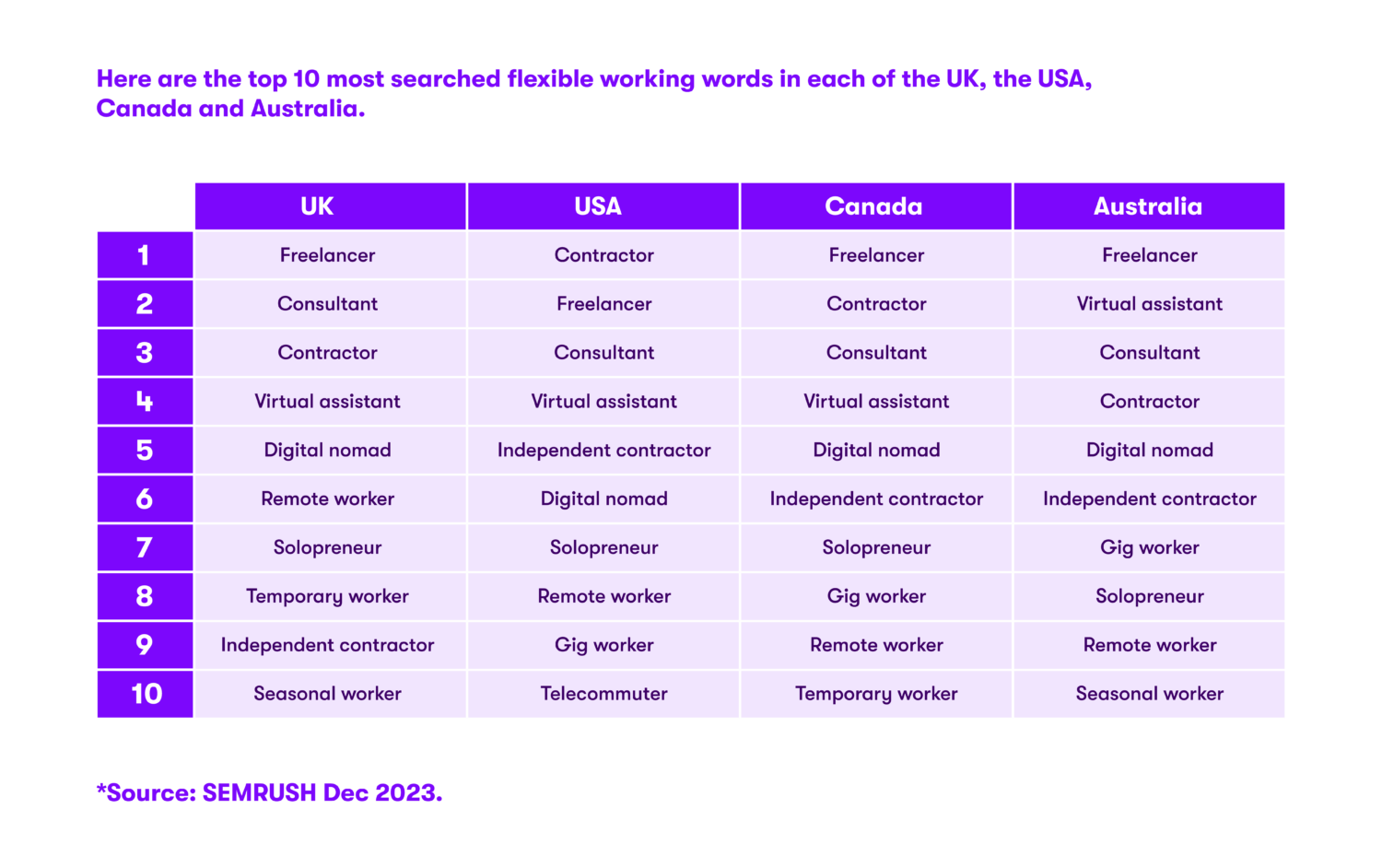Flexible Working, a glossary.
By Dania El-Kadi
Welcome to the dynamic realm of modern day working, where the traditional 9-to-5 grind is becoming a relic of the past. In this blog, we dive into the lexicon of flexible employment, an evolving landscape where agility, autonomy, and work-life balance reign supreme. Whether you’re a seasoned freelancer or looking to venture into the gig economy, understanding these terms is crucial. They are not just jargon; they represent the diverse ways in which people are choosing to work and live. From agile workers who pivot with the pace of change to digital nomads who merge travel with hustle, the future of work is now—and it’s anything but typical.
So, whether you recruit such workers, or if you yourself are looking for this lifestyle, here’s a handy glossary of the terms most often used to describe these jobs.
- Agile worker: An employee who is adaptable and able to quickly switch between different tasks or projects as needed.
- Atypical worker: Someone whose employment doesn’t follow the traditional full-time, permanent model. Basically, anyone outside the typical 9-to-5, long-term employment arrangement.
- Consultant: An expert who provides professional advice or services to organizations or individuals.
- Contractor: A worker who is hired for a specific period or project, often through a contract agreement.
- Digital nomad: A person who uses technology to work remotely while travelling and living in different locations.
- Flex worker: A person who has the flexibility to choose their working hours, location, or duration of employment, often with the ability to adjust their schedule as needed.
- Flexible worker: A person who works different hours, or placements and in different locations. Could be full or part time, as a contractor inside or outside IR35.
- Flexitime freelancer: A self-employed individual who has the flexibility to choose their own working hours within certain parameters set by their clients or projects.
- Flextime worker: An employee who has the flexibility to choose their own working hours within certain parameters set by their employer.
- Fractional worker: A professional who works part-time or on a fractional basis, often in high-level roles like C-suite positions.
- Freelancer: A self-employed individual who offers services to multiple clients on a project basis.
- Gig worker: A person who takes on short-term or temporary jobs, often through online platforms or apps.
- Independent contractor: A self-employed worker who provides services to clients but is not considered an employee.
- Independent gig worker: A self-employed individual who takes on short-term or temporary jobs independently, often through online platforms or apps.
- Independent professional: A self-employed worker who provides specialized services or expertise to clients, often in fields like law, accounting, or consulting.
- Job sharer: Two or more individuals who share the responsibilities and hours of a single job, often to accommodate personal or family needs.
- Mobile worker: An individual who can work from various locations, such as different offices, client sites, or co-working spaces.
- On-demand worker: A person who provides services or completes tasks as needed, often through online platforms or apps.
- Part-time contractor: A worker who is hired on a contract basis for a limited number of hours per week or month.
- Part-time freelancer: A self-employed individual who offers services to clients on a part-time basis, often alongside other employment or commitments.
- Part-time remote employee: An employee who works fewer hours than a full-time worker and performs their job remotely, often from their own residence.
- Part-time worker: An employee who works fewer hours than a full-time worker, often on a regular schedule.
- Portfolio careerist: A person who builds a career by combining multiple part-time or freelance roles, often in different industries or sectors.
- Portfolio freelancer: An individual who assembles a portfolio of different freelance projects or clients to create a diverse income stream.
- Portfolio worker: An individual who assembles a portfolio of different jobs or projects to create a diverse income stream.
- Project-based worker: A person who is hired for specific projects or assignments, often on a short-term or contract basis.
- Remote consultant: An expert who provides professional advice or services to organizations or individuals remotely, often through virtual meetings or communication tools.
- Remote contractor: A self-employed worker who is hired on a contract basis to provide services remotely, often through online platforms or communication tools.
- Remote freelancer: A self-employed individual who offers services to clients remotely, often through online platforms or communication tools.
- Remote worker: An individual who works from a location outside of a traditional office, often using technology to connect with colleagues or clients.
- Seasonal worker: An employee who is hired for a specific season or period of high demand, such as during holidays or tourist seasons.
- Shift-swapper: Employee who exchanges or swaps their assigned work hours or shifts with another colleague.
- Side hustler: A person who has a secondary job or income stream in addition to their primary employment.
- Telecommuter: A worker who performs their job remotely, typically from home, using communication technology.
- Teleworker: A worker who performs their job away from the office, using communication technology.
- Temp worker: A person who is employed on a temporary basis to fill in for absent employees or during peak workloads.
- Temporary worker: An employee who is hired for a limited period to fill in for a specific role or during peak workloads.
- Term-time worker: Someone whose employment contract is specifically aligned with academic terms. They typically work during school terms and have time off during school holidays.
- Virtual assistant: A self-employed worker who provides administrative, technical, or creative assistance remotely.
- Virtual worker: An employee or self-employed individual who performs their job remotely, often using technology to collaborate with colleagues or clients.
- Work-from-home employee: An individual who performs their job remotely from their own residence, often using technology to stay connected with colleagues, customers, suppliers, or other stakeholders.
- Zero-hour worker: A zero-hour worker is an individual whose employment contract doesn’t guarantee a fixed number of working hours. In other words, they are on standby and only work when required by their employer.
- ZZZ’er: A term (occasionally) used to describe workers who have multiple jobs or engage in various projects simultaneously, often to pursue different interests or income streams.
Given the above is an intensive list, are there any words that are more commonly used than others? We looked at the largest 4 countries where English is the main language, and it seems that “Freelancer, Contractor and Consultants” are most in use: Whether you’re a seasoned freelancer or looking to venture into the gig economy, understanding these terms is crucial. They are not just jargon; they represent the diverse ways in which people are choosing to work and live
Whether you’re a seasoned freelancer or looking to venture into the gig economy, understanding these terms is crucial. They are not just jargon; they represent the diverse ways in which people are choosing to work and live
As we wrap up this glossary, it’s clear that the ways we work are as varied as the individuals clocking in. Whether you find yourself as a part-time pioneer, a remote revolutionary, or juggling multiple gigs as a ZZZ’er, these roles embody the spirit of adaptability and choice. But before you leap into the fray of flexible working, it’s essential to consult the applicable laws, taxation, and other relevant legislation governing the country in which you reside or that of your employers or customers. Embrace the freedom they offer and remember that each term reflects a piece of the greater mosaic that is the contemporary working world. If you’re a recruiter looking to better understand this landscape, Sonovate partners with a number of providers who can help. Find them here.
The next time you encounter these terms, you’ll recognise them as signposts of the evolving work culture—one that champions diversity, adaptability, and the individual’s right to craft their own professional path, within the framework of their legal and fiscal responsibilities.
Looking for funding to power up your contractor placements?
Get started now









